Or else they’ll let it burn.
In Russia, millions of acres of forest and parched swamps burn up every year. Volunteers try to put out the huge fires.
Every year forest and peat fires rage in Russia on several million hectares. The state does hardly anything and plays down the scale. Now groups of volunteers are facing the fire. And the ignorance that ignites them.
Andrey Borodin, commander of the volunteer firefighters, makes his way through the battered forest. It could be so beautiful here. But under venerable pines, spruces and alders, tons of car parts are rusting, along with shattered windows and greasy beer bottles. Can ignite the forest floor like a burning glass, says Andrey. And everywhere the dry brushwood left behind by the illegal loggers who are robbing the area of its resources. Tinder, he says. For the area around his Siberian hometown of Ulan Ude, the weather service has announced smoke again.
With hands that used to be more accustomed to keyboards, Andrey pushes the strong branches of a Swiss stone pine aside and steps into a clearing. A wide burn hole actually. Flames have recently eaten it into the green, only a few charred tree skeletons still tower up. From an area the size of a football stadium, all life seems to have disappeared. “The time is ripe for a new generation,” says Andrey, 42 years old, into the silence. “We must teach them how to avoid fires and protect nature.” A hundred yards down the road, somebody torched a pile of electronic waste.
In Russia, millions of acres of forest and parched swamps burn up every year. Nine out of ten fires are caused by humans. They set fire to grasslands to make the soil more fertile. They burn their garbage because there is no regulated waste supply. They set fires in forest areas to prevent a bigger fire or to be allowed to cut down the charred trees for a small fee. They often lose control.
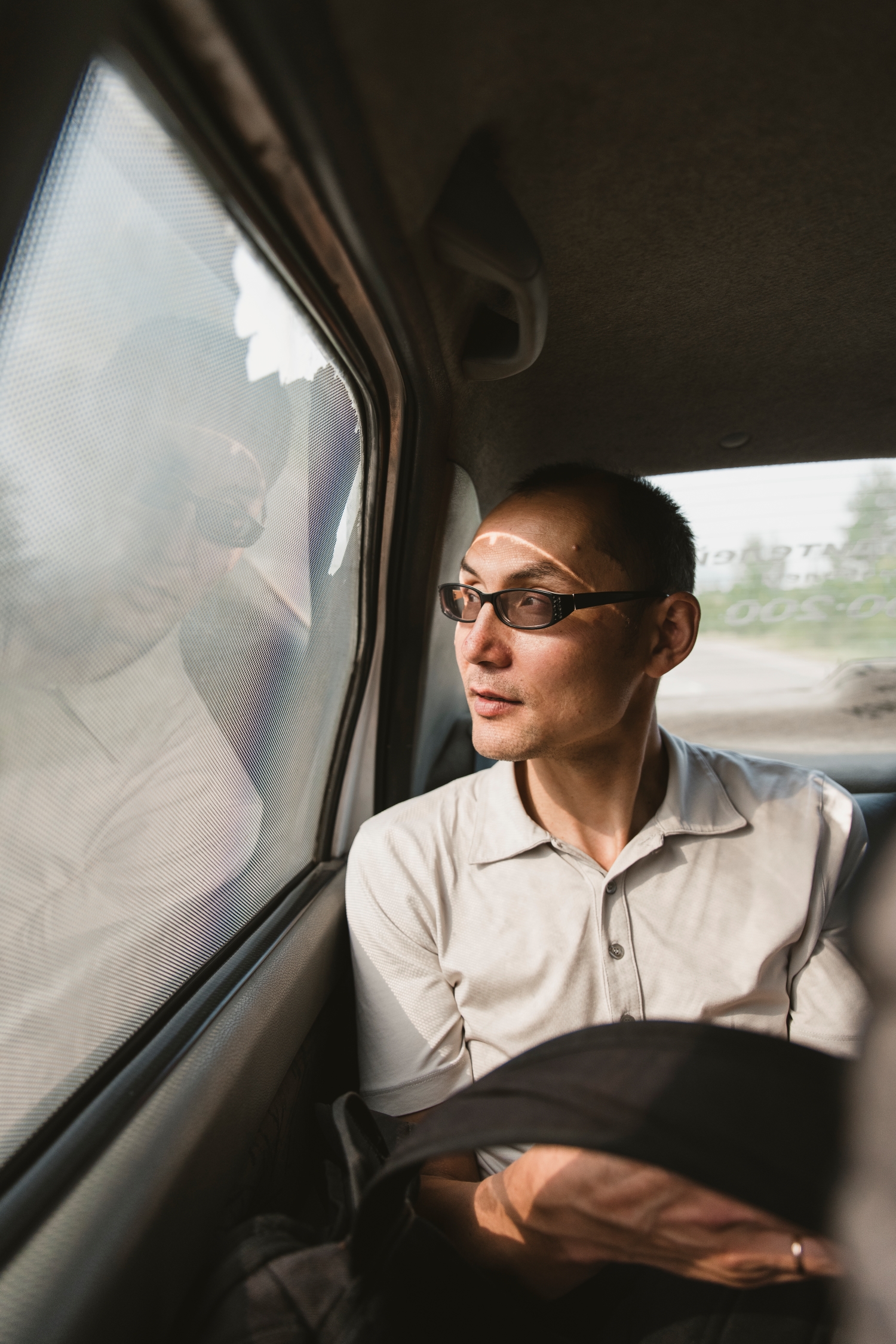
Andrej Borodin, 42 years old, in a Taxi on the way to a former forest fire area near Ulan-Ude, Buryatia, Russia.
“I understood two years ago that we cannot rely solely on the state,” says Andrey Borodin in a taxi through Ulan Ude. In 2016, around 85,000 square kilometers were once again burnt down across Russia, which is roughly equivalent to Austria’s national territory.8.5 millions acres fires vs. 83,879 km² Austria. Source: https://www.washingtonpost.com/world/europe/russian-volunteers-seek-a-foothold-as-wildfires-rage-in-siberia/2016/06/24/ad2a6178-37c0-11e6-af02-1df55f0c77ff_story.html (29.09.2022). We drive past the world’s largest portrait bust – a 7.70-meter-high Lenin head in the city center. The eyes have been designed almond-shaped so that the indigenous Buryat population would also identify with communism. When the smoke came over the city, the great Lenin could not even be seen from across the street. For six weeks.
In 2016, around 85,000 square kilometers were once again burnt down across Russia, which is roughly equivalent to Austria’s national territory.
Andrey used to be a PR man for a telephone company, head of the city’s tourist office and organized the first raves in a hotel when Ude was still dead in post-Soviet Ulan Ude. Today he is full-time responsible for the development of the Russian Republic of Buryatia. “I took on the fires because I know the influential people in the area,” he says. He must get them on his side. And as diplomatically as possible. No authority likes to have a volunteer explain that she is not doing her job properly. He quickly found like-minded people and enjoyed physical work. They extinguished first fires, repaired flood damage and searched for missing people in the taiga. They went to schools, villages, and universities to talk to people about the fire. How to avoid it. How to put it out. Their name, translated into German: Volunteer Fire Fighters Transbaikal. There were five of them – today they have 150 members. And this is just the beginning.
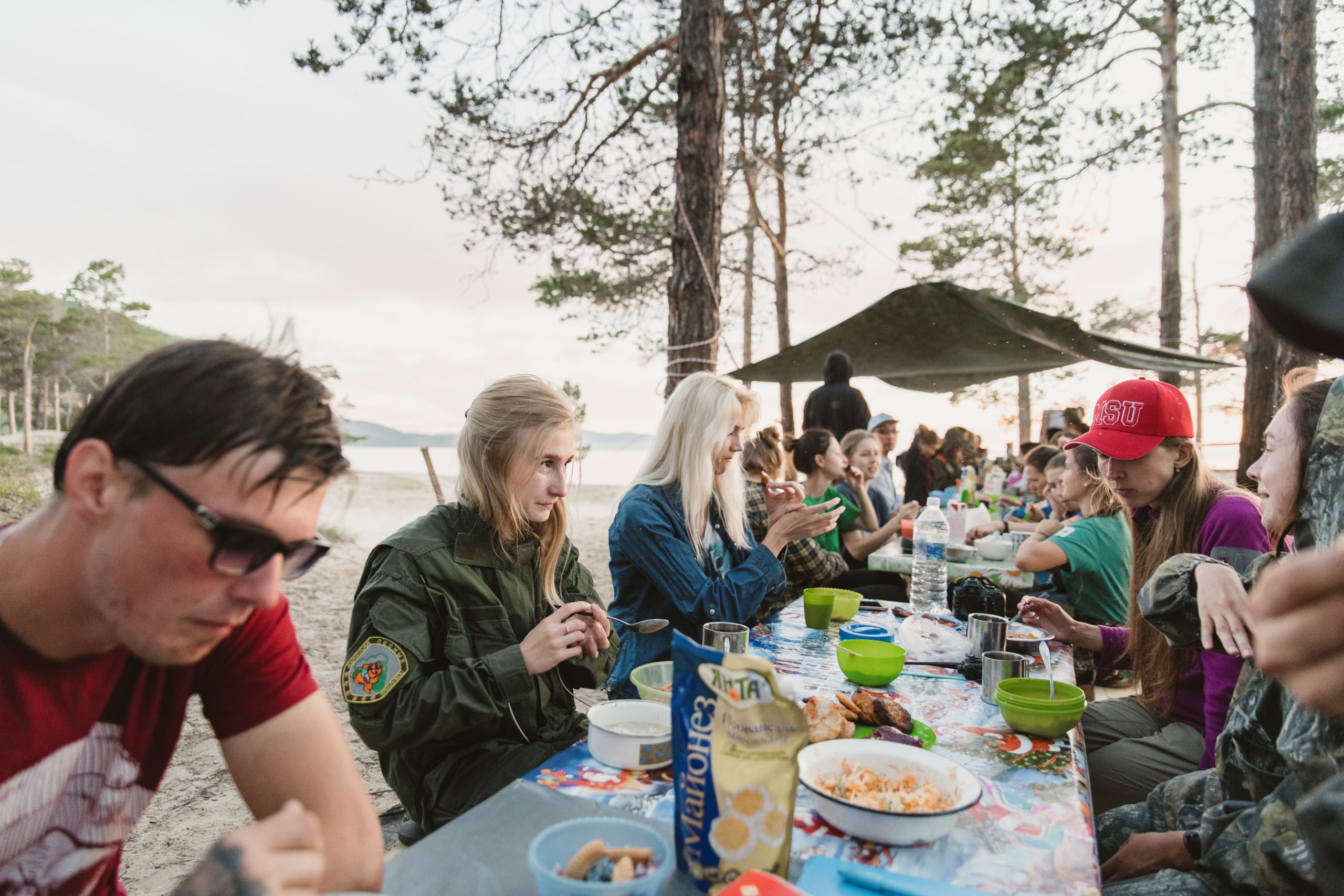
Young volunteers having lunch at the training camp for the Volunteer Fire Fighters Transbaikal near Ust’Barguzin, Buryatia, Russia.
The harbingers of the new Russian civil society stand on the sandy beach of Lake Baikal and open the training camp. The water stretches to the horizon, cold and clear as the truth. Andrey Borodin demonstrates the ritual of his Buryat ancestors on his mother’s side, which is supposed to appease the spirits of this place: A cup of milk, dip the ring finger of the left hand into it, then a drop in any direction. Finally, empty the cup towards the sun. Only positive thoughts. A good three dozen people do the same. Most of them are in their mid-twenties or younger. They are Greenpeace activists, students and members of volunteer groups from other regions. It is the next generation in which Andrey Borodin places his hopes. He dreams of a training center that will network volunteers nationwide. Small groups like his have formed in many places in Russia. Not a matter of course: there were no such grassroots movements in the Soviet Union, and in the period after that people were first occupied with the economic crisis and themselves. “Still many people in Russia can’t understand why anyone should work without being paid for it,” says Andrey.
The training camp is tightly organized. The volunteer firefighters Transbaikal cooperate with the olive green uniformed full professionals of Greenpeace Russia from Moscow, who act as a special task force in the holiday camp. Teaching and practical units from 7.30 to 21.30, a strict ban on alcohol, night rest at 23.00. Discipline and clearly distributed responsibility are essential for survival in the burning taiga. Yura Kostenko is 22 years old and moves with the self-confident composure of a Siberian brown bear through the pine forest where they have pitched their tents. He loves rap music, the good Lord and his homeland – even if he thinks that Russian politics doesn’t care about the common people. Two years ago Andrey Borodin came to the university where Yura studied rescue engineering. “He invited us to go with him to the fires and learn how to fight them,” says Yura. He and some friends joined in. The friends stayed home at some point. Yura felt he was still needed.
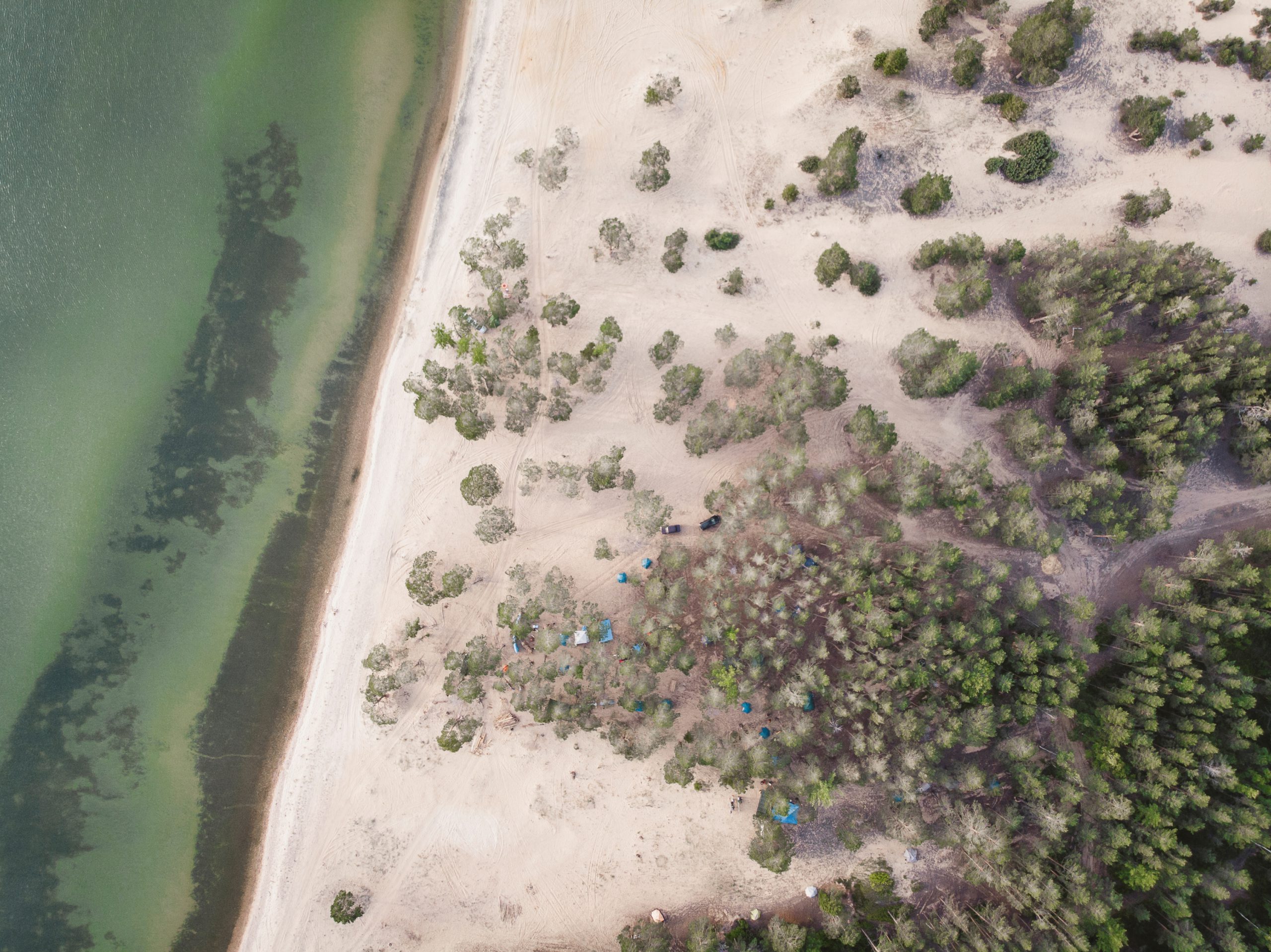
The training camp for the Volunteer Fire Fighters Transbaikal at the shores of Lake Baikal, from above.
He will. Government agencies lack professional firefighters as well as equipment and fuel for the missions. Perhaps there is also a lack of motivation: Vladimir Putin’s government has relaxed the protection of Russian forests for economic purposes and transferred forest supervision to the unprepared regional administrations. At the same time, 70,000 jobs were cut in the already understaffed forestry authorities responsible for fighting fires in the forests. Only the fires were not reduced. Yura’s chubby smile: still that of a boy. His broken incisor: already that of a man who had a fight with an officer during his military service. On his forearms are tattooed portraits of Jesus Christ and the Blessed Virgin Mary. Nevertheless, Yura insists that we go with him into the icy cold Lake Baikal and recite the mantra of compassion and love that he learned from the Buddhist Buryats: Om mani padme hum. There are many paths to God.
Education is more important than water in the fight against fire.
For seven days, the volunteers here learn how fires spread, how to raise money for fire-fighting campaigns via fundraising platforms on the Internet, and how best to deal with the press. They smash commands through the forest, dodge tilting tree trunks and rescue injured people with painted burn marks amidst smoky smoke bombs. Not everyone who takes part in this will be fighting fires later. But all will pass on their knowledge. Education is more important than water in the fight against fire. In one exercise, Yura has to command a group of ten blindfolded people. They are to set up a petrol-driven pump on the lake, attach a thick fire hose to it, roll it out and attach it to an attachment from which three more hoses come off. Yura is only allowed to communicate with them through the sound of his choice: Huh. He runs back and forth, directs by intonation, collects those who get lost. “Victory! Victory! Siiiiiieg!” yells the Greenpeace trainer as, after fifteen minutes, the lake water splashes out of the hundred meter long hoses in the direction of the pine forest. Yura smiles and wipes the sweat from his brow.
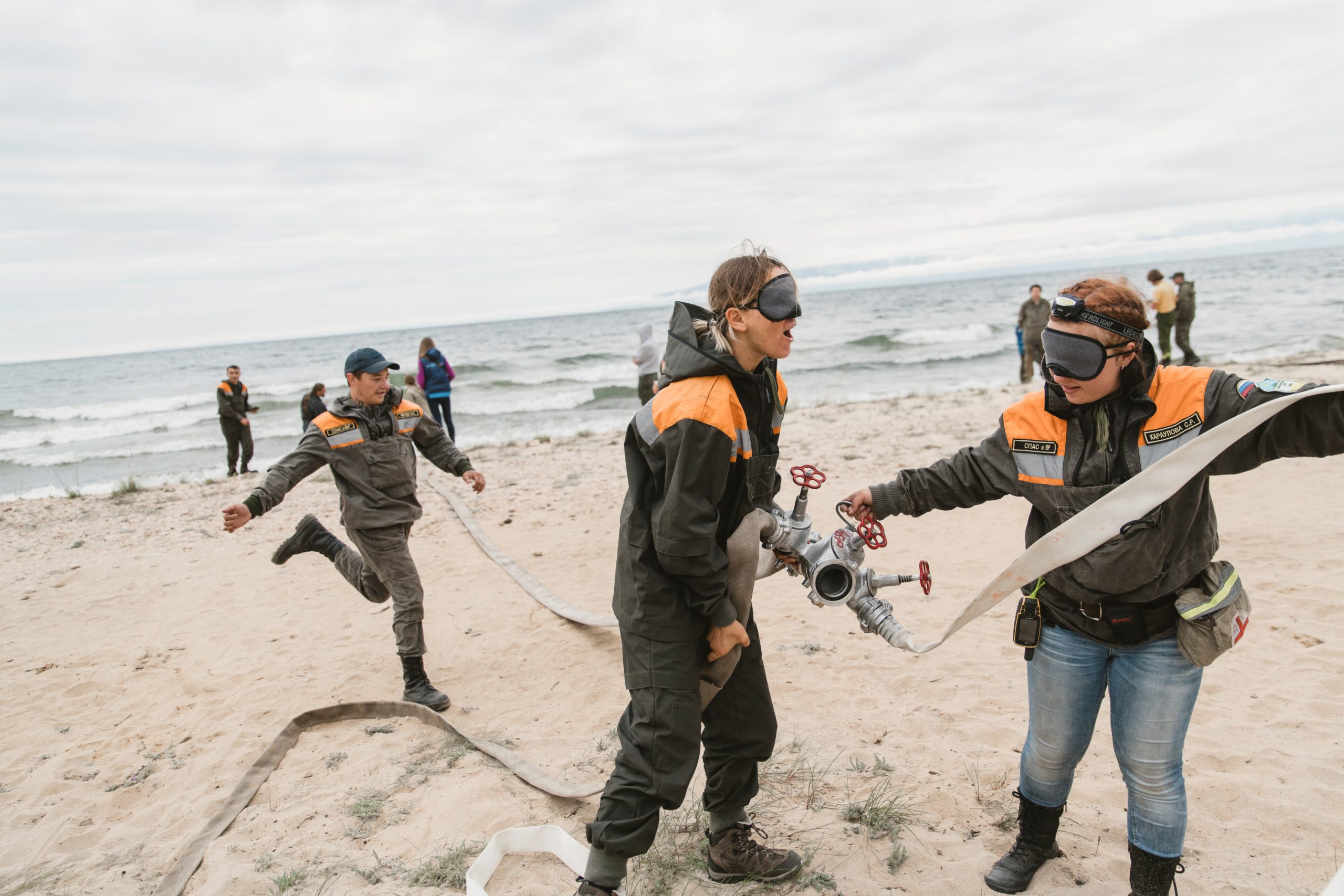
During a blindfolded exercise at the training camp for the Volunteer Fire Fighters Transbaikal.
In the Transbaikal Volunteer Fire Fighters, he accidentally became the leader of the search party for missing persons. “People are lost every day in the taiga,” he says. When a two-year-old boy disappeared, the whole region was alarmed. Yura came to support the main leader of the volunteer corps. They had set up their headquarters in a café in the missing boy’s home village. The person in charge suddenly had to leave and then, well, there was Yura. “Because we wore uniforms, people thought we knew what we were doing,” he says. “Everyone turned to us.” In the end, he coordinated 3,000 searches.
Although he studied, it is almost impossible for Yura to find paid work in the fields of rescue or fire fighting. If it were otherwise, he wouldn’t need so many volunteers. Yura lives in an apartment with his mother, grandparents, and two younger siblings. Money is tight. You’ll soon need a real job, his mother says when he goes out into the woods again to put out fires for days on end or to search for missing people. That’s my job, mum says Yura then.
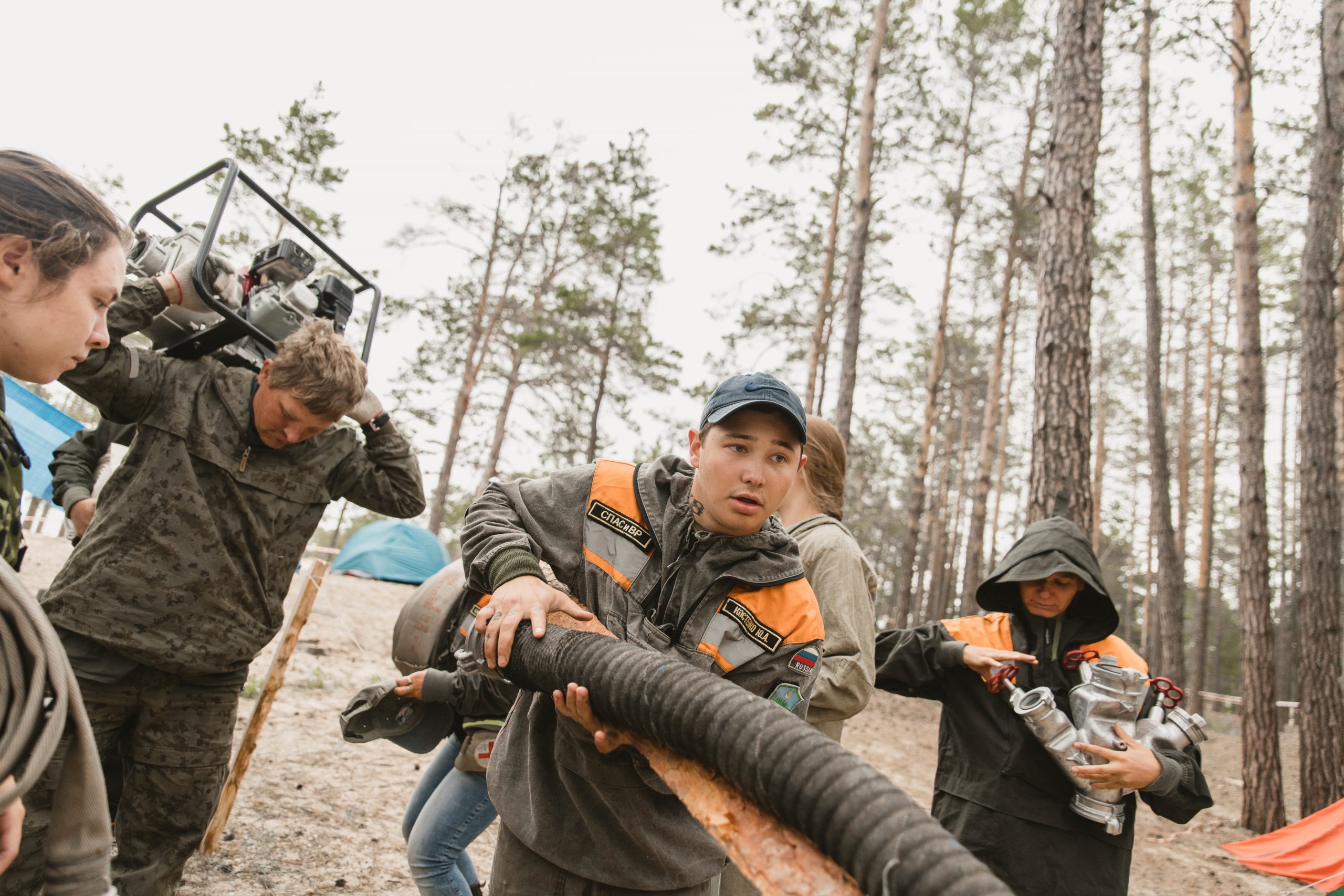
Yura Kostenko, 22, a member of the Volunteer Corps of Baikal, leads an exercise.
Ekatarina Grudinina’s vocation is also the fight against fire. But she has many jobs. The 36-year-old is a mother, IT consultant, cashier in a fruit shop and until recently was employed in an office. She now coordinates voluntary firefighting for Greenpeace in Buryatia, Irkutsk and the Baikal region – and works with Andrey Borodin’s troops. Her last vacation was six years ago. The first grey hairs curl at the temples under her yellow headscarf. “I’ve changed jobs often. I always got bored when situations just repeated themselves,” says Ekatarina. It’s different with fire. “It forces me to think anew each time.” Ekatarina helped to set up the camp days before it opened, then helped to run it, gave lectures, and repeatedly provided food in the nearby village. Her mine remained as balanced as the water of Lake Baikal on windless summer days. After the common conclusion she gathered a group, which is supposed to set off with her the next day towards her small hometown Selenginsk to put out peat fires. “Smoketown,” whispers Yura, who will, of course, be there as always.
The fires burn underground, outlast even heavy rain and cover the surrounding area with toxic smoke, many times more harmful than that of forest fires.
The little town is situated near a wooded peat field, as there are many in the region. In Soviet times, swamps were drained to make way for agriculture or to extract peat for fuel. Today they offer the flames a large area of attack. The fires burn underground, outlast even heavy rain and cover the surrounding area with toxic smoke, many times more harmful than that of forest fires. The peat layers have developed over millions of years from dead plants. When the dried-up peat burns, large quantities of the greenhouse gas CO2 escape into the atmosphere. Ten kilometers from Selenginsk, Ekatarina and her rocking Lada turns off the country road into a forest path. The bus with the helpers follows her. The people in Selenginsk would like what she is doing, she says. Even if some people thought that this was no job for a woman. Many of her friends had also promised her help. “But when it comes right down to it and I call her, they don’t have time.” Ekatarina has learned not to take this personally.
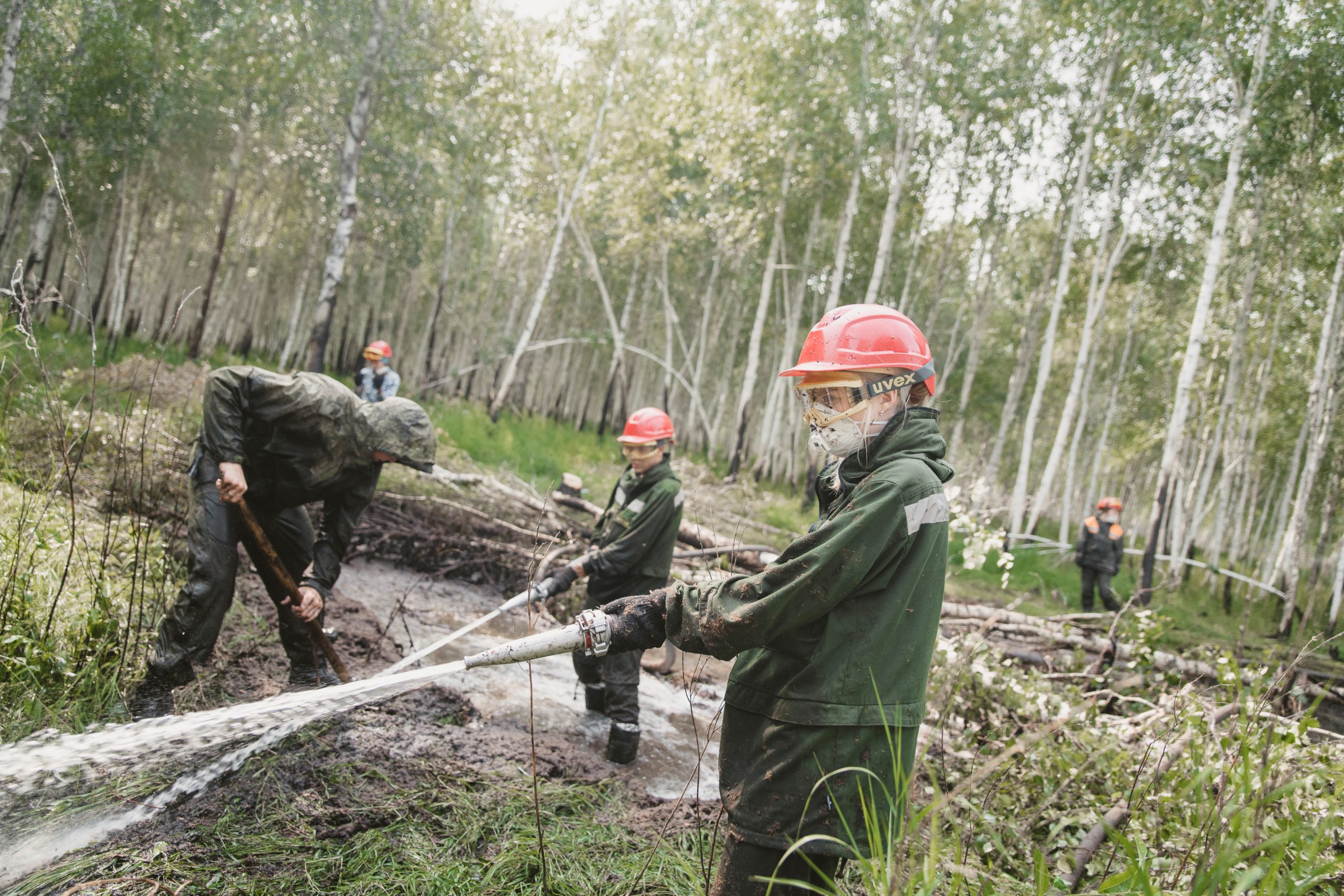
Ksenia Stepanova, 21, on a peat fire extinguishing mission near Selenginsk, Buryatia, Russia.
Biting smoke wafts through the birch grove. The white trunks are black at the bottom, giant trees with charred roots toppled over. Under here lies the peat, up to 600 degrees hot. With thermometer poles, the helpers measure the temperatures in the ground to locate the underground edges of the swamp. The helpers set up the water pumps at the nearby canal and roll out the hoses. One of them falls trees around the source of the fire, threatening to fall over. Then the fight begins. It takes up to a thousand liters of water to extinguish one square meter of peat fire. But you can’t just spray it onto the surface. You have to stir the ground like a breakfast porridge, they say, one meter deep. Until every last lump in it has disappeared. They drive their spades and shovels into the ground to penetrate all the layers. The water shoots out of the hoses, and with a loud hiss, steam clouds rise. Soon they are up to their shins in the mud, working their way through the most stubborn of fires. After five hours, two dozen people have extinguished about 40 square meters with all their strength.
Ekatarina has long since discovered new sources of fire on the other side of the canal. They are bigger and there are many. “We have people who would put them out,” she says. “But we have no money left.” After the fire year 2016, the troops received 1.5 million rubles [2018, at the time of the publication of the report – editor’s note] from the Buryat Republic, the equivalent of about 19000 euros. The money was spent on equipment, rental buses, fuel, and food. The relationship between the authorities and the volunteers is divided. How political are their concerns? What is their agenda?
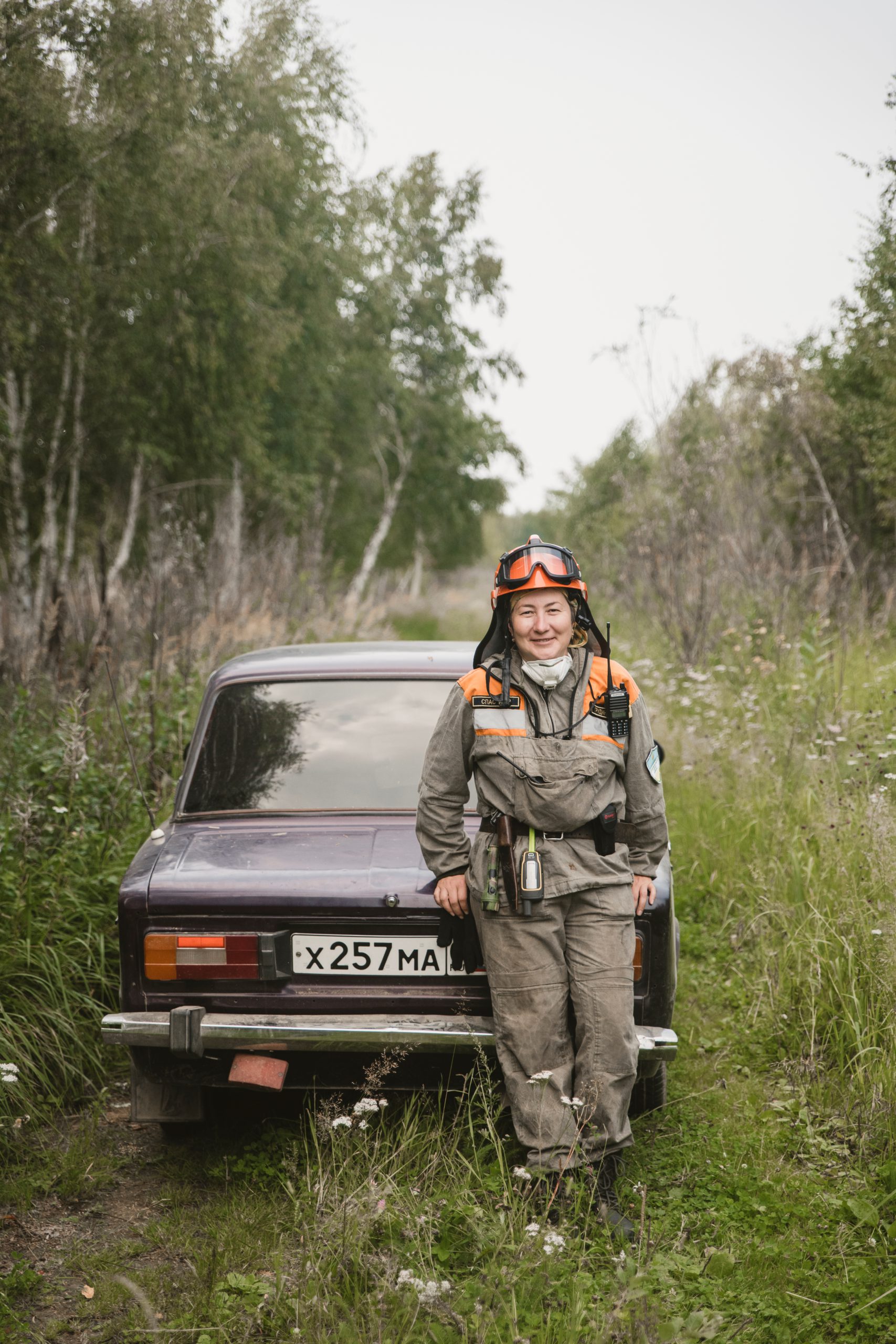
Ekaterina Grudinina, 37, a member of the Volunteer Corps of Baikal, in front of her Lada 6 during a peat fire extinguishing operation.
With a new law, they want to get the groups to register. They would then be allocated to fixed areas. Health insurance and financial support are on the cards. For this they will have to coordinate with the authorities. The volunteers are skeptical: are they just trying to get us under control? Ekatarina says she can live well without such registration. And finally, she is tired. She is looking forward to her son, a real bed and milk that comes directly from the farm instead of from a carton. In the darkness, she turns off the forest road and onto the holey country road, which gives the Lada blows from below. The car swings like a ship in the swell. Suddenly, with one blow, the lights go out. “This is what happens when a Russian car hits a Russian road,” says Ekatarina and laughs. She pulls over, gets out, opens the hood. She knows what to do: roll up her sleeves and shake the ailing machine a little. Then the lights go on and Ekatarina drives off.
Original in German. First published in the #06/2018 issue of Greenpeace Magazin.
Translated into English by Max Street.
This text is protected by copyright: © Martin Theis. If you are interested in republication, please contact the editorial team. Copyright information on pictures, graphics and videos are noted directly at the illustrations or on top of the article. Cover picture: Smoke from smoke grenades during a training operation at the training camp for the Volunteer Fire Fighters Transbaikal on Lake Baikal near Ust’Barguzin, Buryatia, Russia. Photo: Fabian Weiss